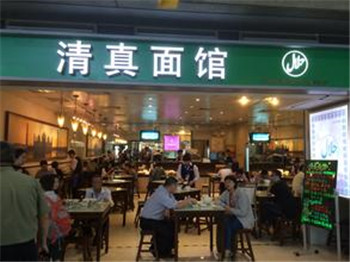在上海现代化的摩天大楼之间,一项古老条约的缔约各方发生了战争。
Amid the modern skyscrapers of Shanghai, the parties to a time-honored treaty are at war.
这场冲突的结果,关系到一个价值数十亿美元的产业,以及一个少数民族在飞速变化的中国,能否守住他们的传统习俗。
At stake are the spoils of a multibillion-dollar industry and a minority group’s ability to retain its customs in a fast-changing China.
此外,还有面条。
Also, noodles.
上个月,咸国林在上海开了一家卖手工牛肉拉面的清真餐厅。
When Xian Gulin opened a halal restaurant in Shanghai last month that serves hand-pulled beef noodles, he hoped patrons would line up at his door.
他希望店门口能排起长队,然而,他看到的却是抗议者在店门口堵了几个星期。
What he got instead was an entrance blocked for weeks by protesters.
这些抗议者和咸国林一样,都是回族人,属于穆斯林少数族裔,起初来自中国西北。
The protesters, like Mr.
他们抗议店主违背了一项陕甘宁条约。
Xian, were Hui, a Muslim ethnic minority, originally from China’s northwest.
这是一个社会约定,禁止回族人在已有清真拉面店的方圆400米之内开拉面馆。
They accused the restaurateur of violating the Shaanxi-Ningxia-Gansu Treaty, a social pact that forbids the Hui from opening halal noodle shops within 400 meters of each other — roughly 1,300 feet.
为了安抚抗议者,咸国林最终同意摘下店铺门面上的清真标志。
To appease the protesters, Mr. Xian eventually agreed to take down the halal insignia from his storefront.
陕甘宁条约的起源人们不得而知,但是餐馆经营者说,起初,该条约将一个回族村庄中的面馆数量限制为一家。
The origins of the treaty are unknown, but restaurateurs say it originally capped the number of noodle shops in a Hui village at one.
随着越来越多的回族人向中国东部不断发展的沿海城市迁移,他们带去了条约的一个不同版本。
As more Hui began moving eastward into China’s growing coastal cities, they brought a variant of the treaty with them.
回族作为一个群体,维护他们的清真传统和餐馆是他们生存的关键。
For the Hui as a community, maintaining their halal traditions and restaurants has been critical to their survival.
因此,在一个高度资本化的社会,这些竞争浮出水面并不奇怪,加利福尼亚州波莫纳学院的人类学教授、中国少数民族研究专家德鲁•格拉德尼(Dru Gladney)说。
So it’s not surprising that in a highly capitalized society, these rivalries would bubble to the surface, said Dru Gladney, an anthropology professor at Pomona College in California and an expert on Chinese ethnic minorities.
随着中国寻求与中东以穆斯林为主要民族的国家建立更紧密的经济联系,清真餐饮业也在中国繁荣发展。
The halal food industry has flourished in China as the country has pursued closer economic relations with majority-Muslim Middle Eastern nations.
仅在青海省,2014年清真餐食的销售额就达到了约28亿美元。
In Qinghai Province alone, sales of halal food products in 2014 totaled about $2.8 billion.
在中国的社交媒体平台微博上,网民们谴责那些抗议活动。
On Weibo, a Chinese social media platform, online commenters condemned the protests.
就连青海省伊斯兰教协会也加入其中,称对咸国林餐馆的抵制违背了公平竞争,引发社会不稳定。
Even the Islamic Association of Qinghai got involved, declaring the boycott of Mr. Xian’s restaurant a violation of fair competition that caused social instability.
然而,回族餐馆的店主们坚持认为,该条约比以往任何时候都更重要。
Still, Hui restaurateurs insist that the treaty is more necessary than ever.
我们努力了那么久为了爬到我们现在的位置,不能容许不尊重条约的人,37岁的马依波拉(音)说,他在上海开一家清真面馆。
We worked so hard to climb our way up, so we can’t tolerate people who do not respect the treaty, said Ma Yi Buo La, 37, who owns a halal noodle shop in Shanghai.
不按照条约的人不是好人,他说。
People who don’t abide by the treaty, they’re not good people, he said.
不过,随着清真菜在中国各地越来越流行,执行陕甘宁条约也变得日益困难。
Yet enforcement of the treaty is increasingly difficult as halal cuisine becomes more popular across China.
在老家,村里有这习俗,但我觉得在大城市里没有人尊重,19岁的甘肃人马科夫(音)说。他现在在北京的一家清真餐厅工作。
It was a tradition in our villages back home, but I don’t think anyone really respects this treaty anymore in large cities, said Ma Kefu, 19, a Gansu native who now works at a halal restaurant in Beijing.
为了说明自己的观点,他指向马路的对面。
To make his point, he gestured across the street.
不到15英尺之外就是另一家清真餐厅,店铺上精致的清真标志十分醒目。
No more than 15 feet away stood another halal restaurant, its intricate halal insignia prominently on display.
